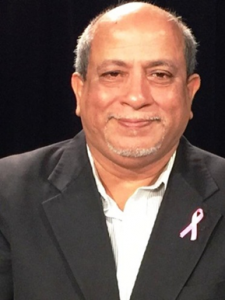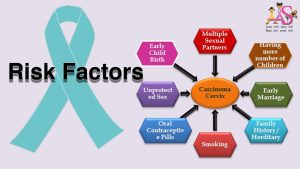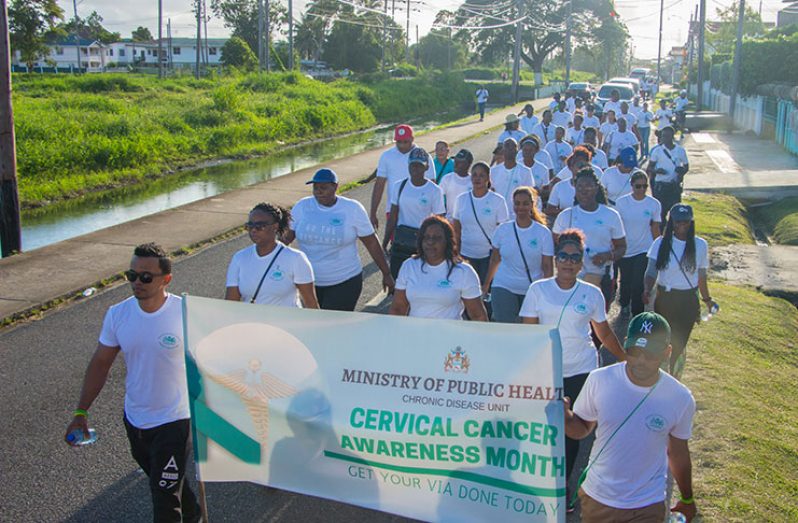… more awareness needed; Director of Cancer Institute of Guyana
A sharp increase in cervical cancer in Hinterland women has been detected by the authorities in recent years and Director of the Cancer Institute of Guyana , Dr Syed Ghazi believes this may be linked to the lifestyle of the people living there.
Dr Ghazi told the Guyana Chronicle recently that there may also be other risk factors attached to the instances in Hinterland areas as compared to the urban population.
With early detection lives can be saved, Dr Ghazi explained that in the earliest of stages it can be eliminated completely which makes it treatable.

A silent killer
Cervical cancer is a type of cancer that occurs in the cells of the cervix — the lower part of the uterus that connects to the vagina.
Various strains of the human papillomavirus (HPV), a sexually transmitted infection, play a role in causing most cervical cancer.
When exposed to HPV, a woman’s immune system typically prevents the virus from doing harm. In a small group of women, however, the virus survives for years, contributing to the process that causes some cells on the surface of the cervix to become cancer cells.
You can reduce your risk of developing cervical cancer by having screening tests and receiving a vaccine that protects against HPV infection.
Where cervical cancer begins?
Cervical cancer begins when healthy cells acquire a genetic change (mutation) that causes them to turn into abnormal cells.
Healthy cells grow and multiply at a set rate, eventually dying at a set time. Cancer cells grow and multiply out of control, and they don’t die.

The accumulating abnormal cells form a mass (tumor). Cancer cells invade nearby tissues and can break off from a tumor to spread (metastasize) elsewhere in the body.
It isn’t clear what causes cervical cancer, but it’s certain that HPV plays a role. HPV is very common, and most women with the virus never develop cervical cancer. This means other factors — such as your environment or your lifestyle choices — also determine whether you’ll develop cervical cancer.
Types of cervical cancer
The type of cervical cancer that you have helps determine your prognosis and treatment. The main types of cervical cancer are:
Squamous cell carcinoma. This type of cervical cancer begins in the thin, flat cells (squamous cells) lining the outer part of the cervix, which projects into the vagina. Most cervical cancers are squamous cell carcinomas.
Adenocarcinoma. This type of cervical cancer begins in the column-shaped glandular cells that line the cervical canal.
Sometimes, both types of cells are involved in cervical cancer. Very rarely, cancer occurs in other cells in the cervix.
Risk factors
Risk factors for cervical cancer include:
-Many sexual partners. The greater your number of sexual partners — and the greater your partner’s number of sexual partners — the greater your chance of acquiring HPV.
-Early sexual activity. Having sex at an early age increases your risk of HPV.
-Other sexually transmitted infections (STIs). Having other STIs — such as chlamydia, gonorrhea, syphilis and HIV/AIDS — increases your risk of HPV.
-A weak immune system. You may be more likely to develop cervical cancer if your immune system is weakened by another health condition and you have HPV.
-Smoking. Smoking is associated with squamous cell cervical cancer.
What the statistics reveal
The Cancer Institute of Guyana Inc has revealed that patients treated with radiation therapy from 2010 to September 20, 2018 are as follows:
In 2010, they recorded 25 cases, 42 cases in 2011; 18 cases in 2012; 54 cases in 2013; 41 cases in 2014; 68 cases in 2015; 55 cases in 2016; 35 cases in 2017 and 32 cases in 2018 so far, with a total of 370 cervix patients.
Cervical cancer occurs in sexually active women and kills some 36,000 women in the Americas every year, said Dr Ghazi , who also related that a lot of women suffer from cervical infections which comes as a ‘precursor’ of cervical cancer.
He pointed out that it can cause non-cancerous vaginal warts and sexually transmitted diseases by women who have multiple sexual partners, women with multiple pregnancies, and there are so many risk factors such as, smoking or late menopause.
Dr. Ghazi added that cancer is the transformation of cells can it could happen in women who are immune compromise like diabetes, HIV those women are more exposed to this transformation to cancer.
He reported that screening is the first step, that is a pap smear and they reach out to far-fetched areas annually where they would see about 1000 women.
READ MORE about Cervical Cancer here: http://guyanachronicle.com/2017/07/16/hpv-and-cervical-cancer-awareness
Annual outreach
Dr. Ghazi added that an annual outreach to the interior and other rural areas is facilitated by an Australian grant which he deemed a good contribution towards the screening of women in those areas.
“We have to change our mind set and start talking about cancer being curable and the first stage is to get a yearly pap smear that is, the screening test for girls or women once they become sexually active,” he said.
The doctor related that there is a need for more health education because there are so many factors like such as the lifestyle, and risk factors.
Dr. Ghazi talked about the much-touted HPV campaign done by the government to get girls vaccinated since prevention is better than cure.
The Cancer Institute of Guyana was founded in 2006 in collaboration with the Ministry of Health and services offered are not free but subsidised because cancer treatment is very expensive.
Dr. Ghazi said, “In this region we have invested in high end equipment for specialised treatment at the institute so it is difficult to offer free services but they do not turn away patients in need because the idea behind the facility was conceptualised out of compassion more than a business.”
He told this newspaper that cervical cancer is a ‘monster’ and more awareness campaigns should be held so as to educate society since the disease needs to be fought collectively. He disclosed that they are part of the Healthy Caribbean Coalition (HCC) which is an umbrella organisation of different cancer organisations and cancer centres.
Cervical cancer survivors
The Guyana Chronicle however, spoke to cervical cancer survivor, 46-year-old Esardai Nankoo, who was diagnosed with the ailment last year.
She recalled having serious belly pains and was taken to the hospital and was told she has cervical cancer. Nankoo, a mother of three said she was devastated and it was difficult for her to cope but with treatment which was very costly she is cancer-free today.
She added that the journey was not easy but is thankful she is better and still goes for her check-ups every three months.
As for 65-year-old Rukhmin Mortley, she found out she had cervical cancer in February last year after waking up one morning and going to the washroom where she recalled she was bleeding severely and was taken to the hospital.
She added that she had no symptoms and after medical intervention she was told she had stage three cervical cancer for which she underwent rigorous treatment.
Mortley, a mother of two stated that today she is doing well as a cervical cancer survivor but the treatment was intense and she endured a lot of pain and expended a lot of money.
Today, she is happy to be alive and well.




.png)









